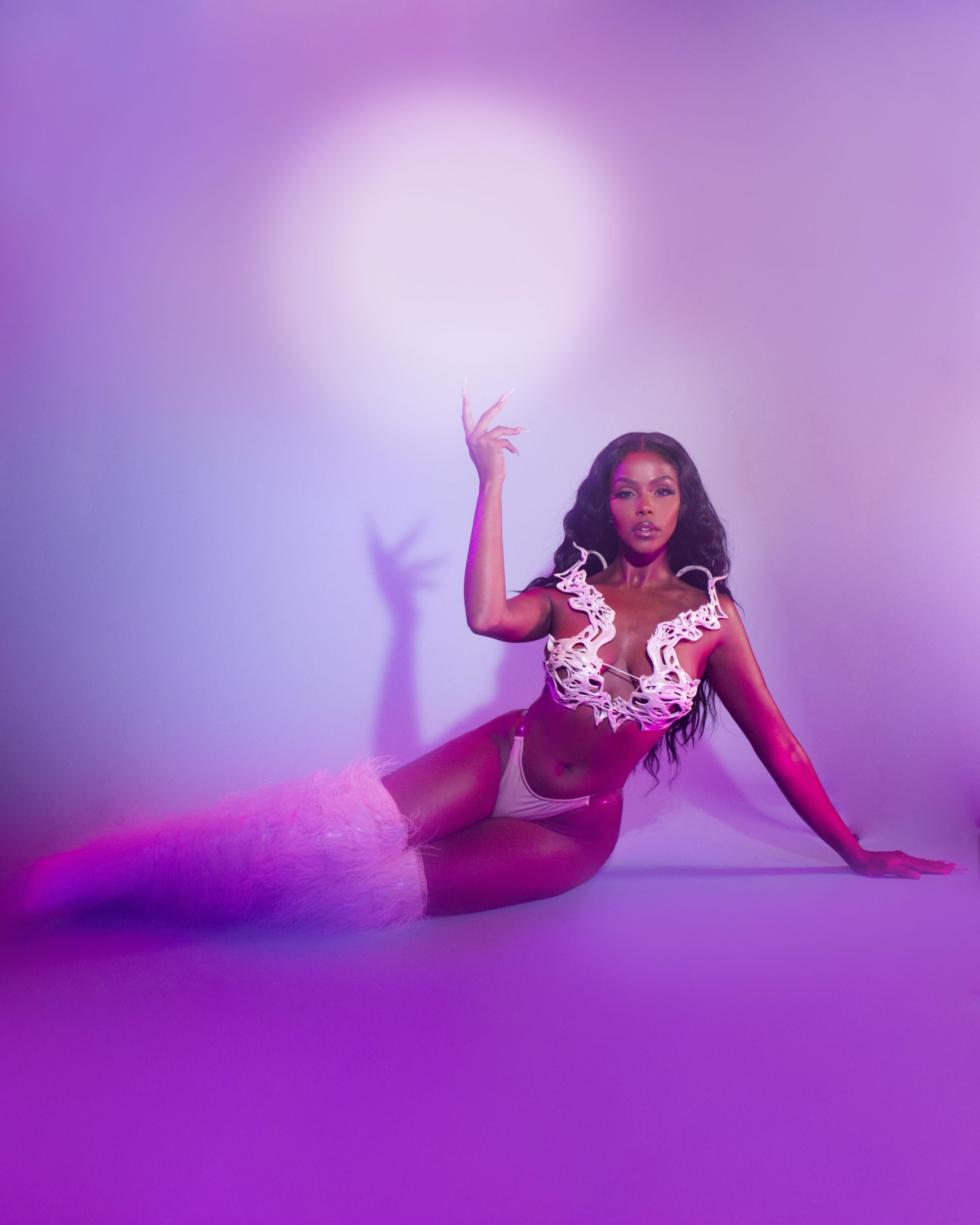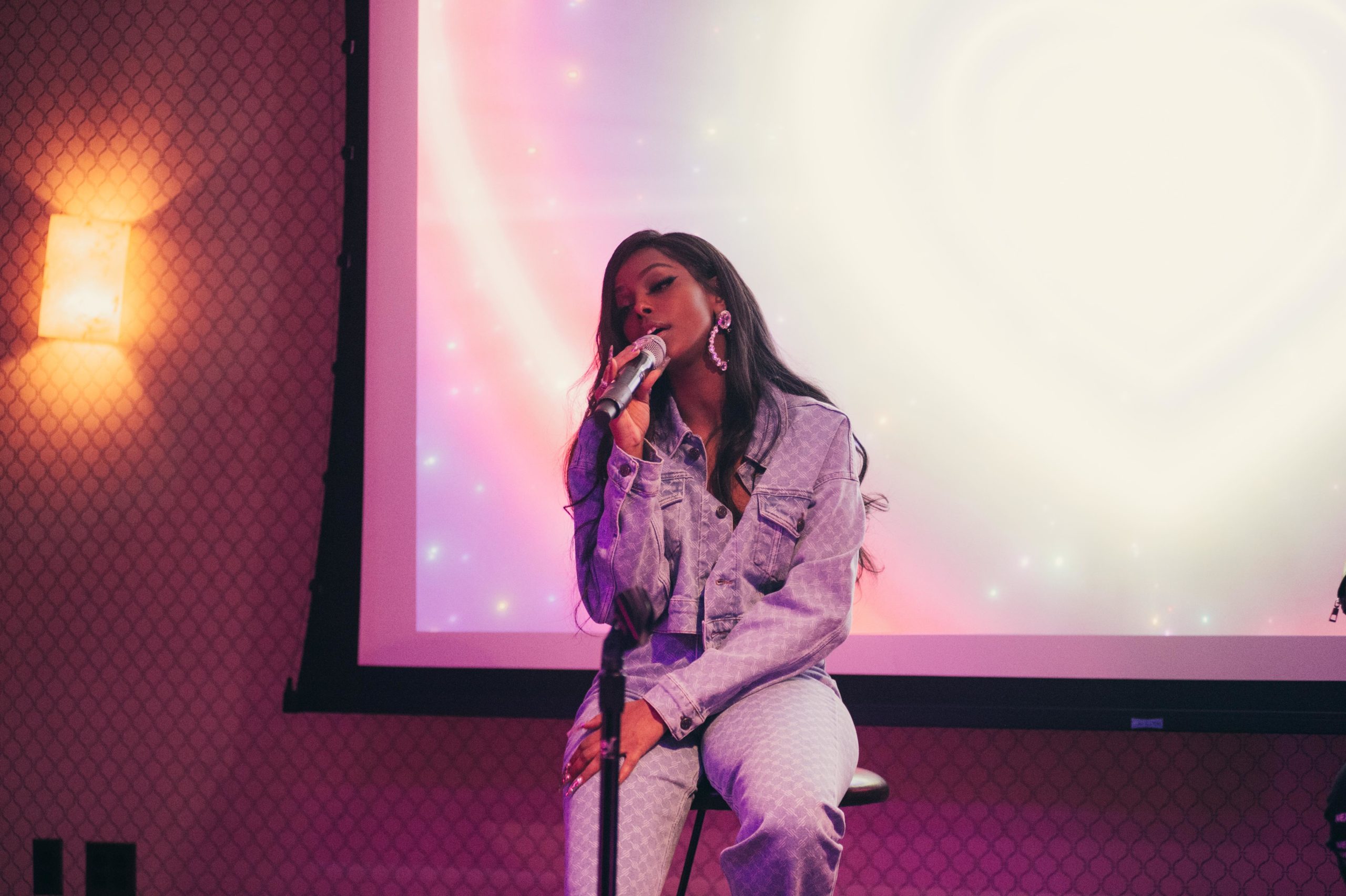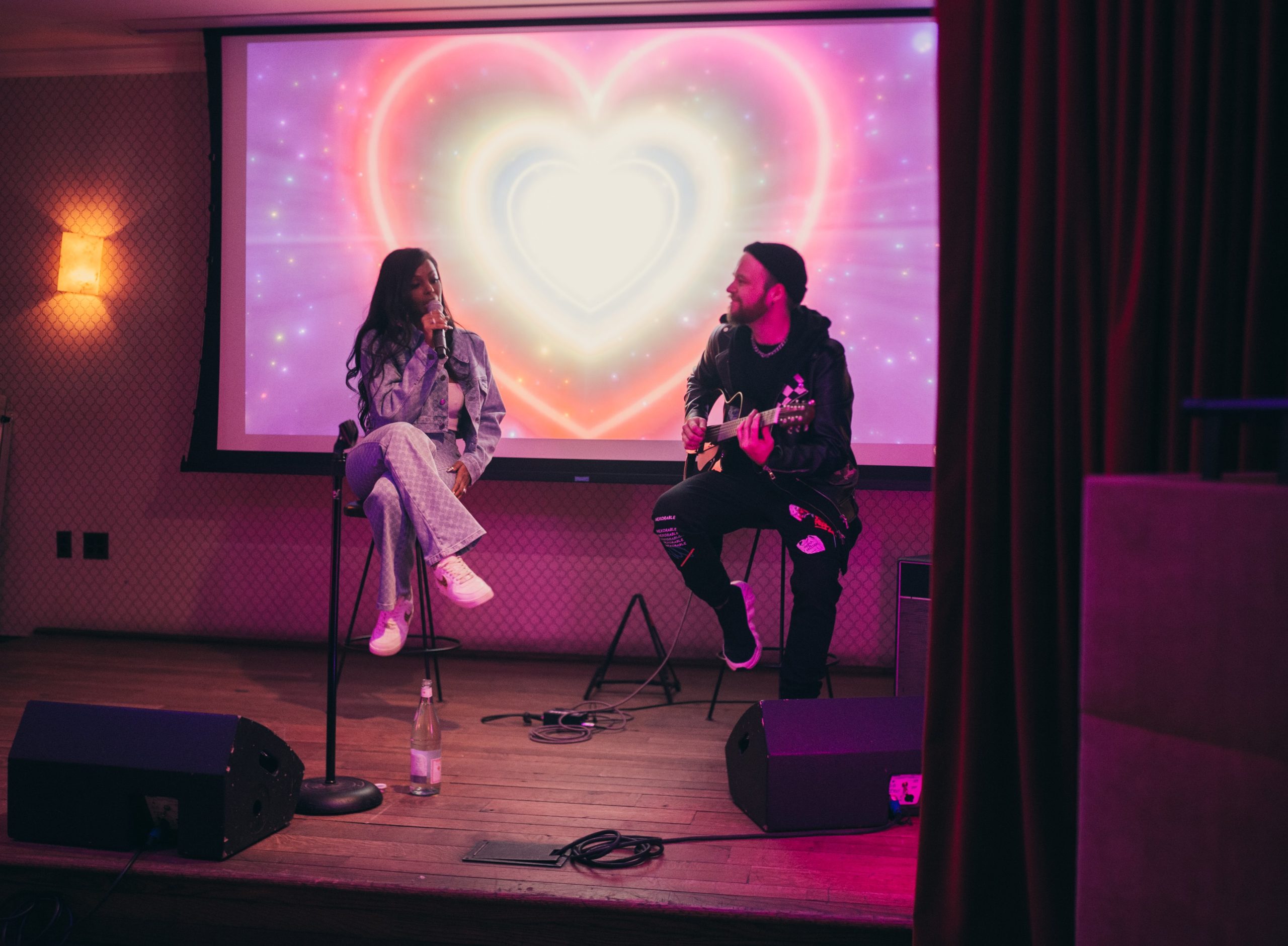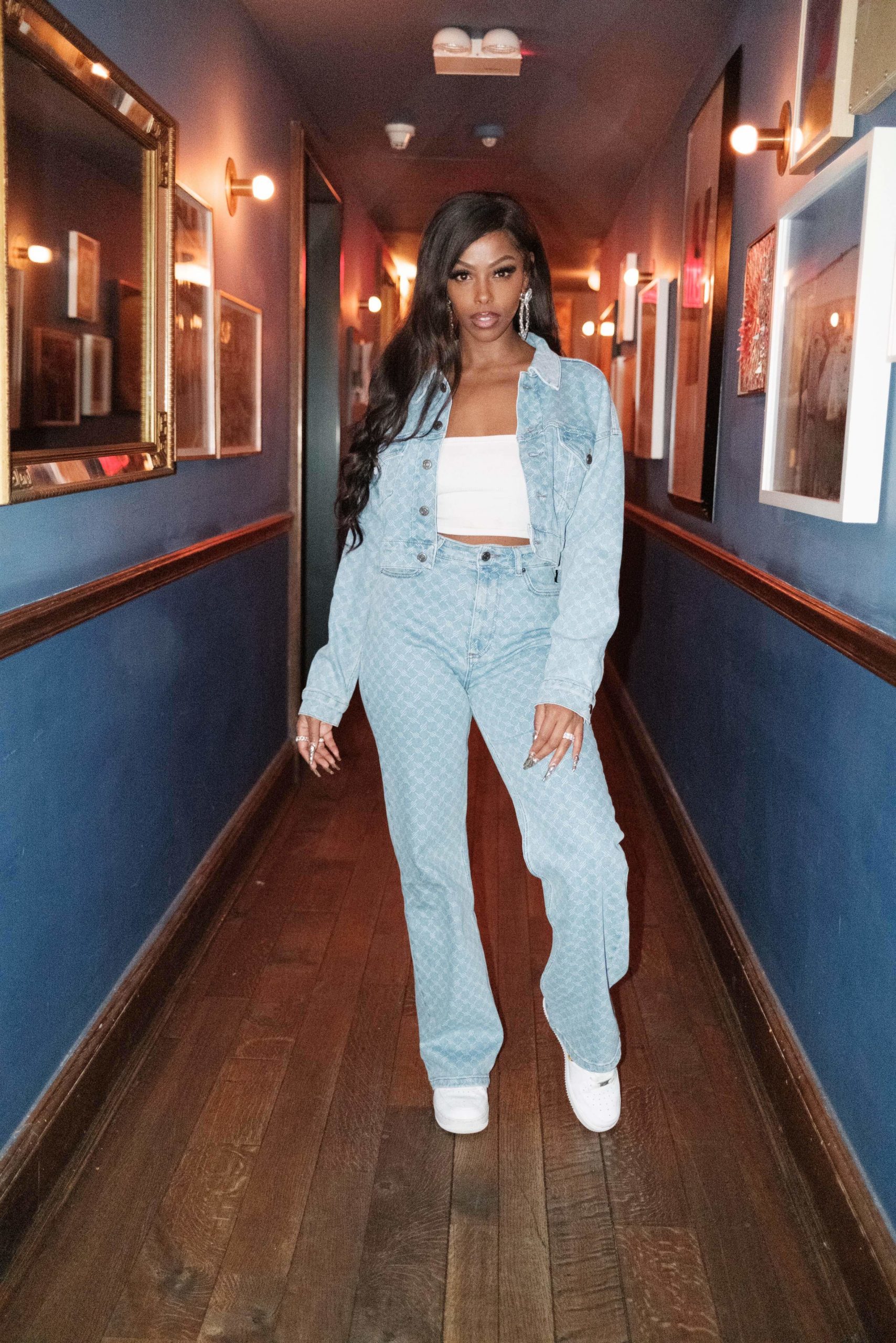Amaal Defines Sexual Liberation in New EP
The Somali-Canadian artist shares the inspiration for Milly in an exclusive interview with V.

Somalia is often referred to as “the land of the poets,” a country where members of the community are actively engaged with the spoken word and music. And while this tradition dates back centuries, there are several artists who are continuing to honor their heritage and progressing the craft today. Among this long lineage of artists is Amaal, a Somali-Canadian singer-songwriter who uses her music to explore life’s most intimate relationships. Despite the numerous barriers she encountered, she’s always felt a deep, almost ancestral connection with music – much to the credit of her grandmother, who was one of these prominent community poets.
“I feel like it seeped into my genetics and that’s why this path was something that I always felt a deep calling for,” Amaal elaborated. “Because for me to get into it without having anybody who looks like me, with pushing back against the negative feedback and sometimes going against family. You know, there’s a reason.”
Amaal’s new EP is titled Milly, aptly named after a nickname she adopted to anonymously explore the world outside her tight-knit community. “It wasn’t even our Alter Ego, it just was our own way of having anonymity so we could be ourselves. So we can express ourselves without judgment,” the Juno-nominated artist shared. Amaal grew up in Toronto, having to flee from her home country of Mogadishu after years of political and social turmoil. By the time she reached her 20s, Amaal became emboldened to make music and pursue her creative ambitions. She started building her confidence and reckoning with heartbreak in Black Dove – and this EP continues on that core ethos.
Blending old-school R&B with her ethereal vocals, the new EP explores sexual empowerment from a young woman coming into her own. In particular, her song “Heaven” showcases the unapologetic goddess and the confidence within her. Produced in collaboration with GRAMMY-nominated duo Nicky Davey, the song looks at Amaal’s journey into sexual liberation and the process of uncovering her own autonomy. Milly is Amaal, and this sophomore EP proves the only validation worth seeking comes from within.
Over the weekend, the singer-songwriter ushered in her latest project with an intimate EP release party at Ludlow House in New York City. To a crowd of friends and family, she performed favorites like “Honey” and “Renegade.” We sat down with Amaal an hour before she performed to chat about the new release and the emotions running through her at the moment.
V MAGAZINE: Congrats on Milly! What are some emotions going through you right now as you’re about to perform it for the first time at Ludlow House?
AMAAL NUUX: Thank you. Oh my god, honestly, I think I’ve felt every emotion from excited, happy, nervous, absolutely nervous and, but also blessed and grateful. It’s like a roller coaster. But overall, very grateful and blessed because I’ve actually been wanting to get this out for a while, you know, the last year and a half has been tough for all of us. So to be able to come out with this and already get the response that I did. It’s an honor, it really is. I’m happy.

V: What’s the process of creation been like?
AN: When I first started doing music, because of my upbringing, music was considered very taboo. And it wasn’t something that was encouraged, let alone for a woman, it really wasn’t. And when I started getting into it, there was no girl from where I’m from doing music. There was like a group, but it just wasn’t out there on a high level or even beginning and so I didn’t have anybody to look to. And when I first started doing music, there was a lot of backlash, and a lot of criticism. And it really, sort of, it kind of pushed me into making music that I felt was okay for them. That would lessen the blows that would lessen the hate and so I was no longer making music for myself, I was conforming, and just really creating out of fear. And the last couple of years and making this project, it’s been undoing all of that work. And really this project has been my therapy and my form of self liberation. I don’t care anymore about the thoughts of others. My stories are valid, my experiences are valid, they’re beautiful. You know, they’re crazy, but they’ve made me who I am so how dare I be ashamed of them? That’s the sort of the space that I’ve been in and I feel like I’m more whole and stronger as a woman.

V: For sure. And how does the title Milly come into this? What is the significance of the EP title?
AN: My nickname is Milly. That name was given to me by my friends when we were teenagers. And the way it started is, I was growing up in a community that was predominantly of my background, and whenever we would go out and have fun or party, there would be a potential of those things coming back to our area – you know, how a rumor turns into another rumor. And all of a sudden, there’s things being said about you that are so false and we experienced that. And so a lot of us girls started adopting aliases, and they were almost, it wasn’t even our Alter Ego, it just was our own way of having anonymity. So we could be ourselves. So we can express ourselves without judgment and without the eyes and you know, whispers so we all had nicknames. And we’d go out and party and have fun and they’d be like, ‘Oh, I was hanging out with a Somali girl named Milly.’ Nobody would know who that is. That’s the story.
V: And when did you decide to adopt your own name? Was there a distinct moment or culmination of moments?
AN: Definitely a culmination of moments. And the biggest one was because I was feeling little bits of it beforehand. I remember finishing a project, and I played it for my friend, and he listened. And it was music that was similar to what I was making to appease everyone. And so he heard it, he was just like, ‘I don’t know. I mean, it’s good. But like, I’ve heard this from you before. What else is there? This is kind of getting a bit repetitive.’ And it hurt, it really did. But then I sat with it. And I thought, I’ve been feeling kind of suffocated. And now you tell me this, and I’ve been wanting to write about other things. That right there was my moment. And then my friend in the studio, he was just like, ‘Listen Amaal, you are a statement already, like you doing what you’re doing is an act in itself. You’re getting on stage being in the studio is a statement.’ And I was like, ‘Wow, you’re right.’ Those were the huge moments.

V: Yeah and with that self-realization, what do you hope the EP does? What message do you want to send to listeners?
AN: Oh, man, I think my biggest thing that I would love for people to take away from me, my music is to live a life of questioning the things that you were taught. Is it really your ideas? Is it something that was downloaded to you – not conforming and not changing yourself to fit into what may be the right thing. Because it does take a lot of bravery to kind of go against even your parents and the ideas and things that you were taught. So I think that would probably be my biggest thing is to always just try to be fearless and brave in whatever it is that you’re doing.
V: And moving on to some specific songs on the EP can you bring us through the production of “Honey” and working with Nicky Davey?
AN: Yes. Nicky Davey, they actually did “Honey,” “Heaven,” “Special” and “Renegade.” So we started off, we got an Airbnb in October 2019. And, right away, I put on the board, Milly like, this is what this project is going to be because I’m going to live in that space of feeling like that. It’s already in me, but I’m not going to shy away from it anymore. I’m gonna totally embrace it. And that’s what it was, it was embracing my stories and not having – no more shame. I have to let go of a lot of that. I carried a lot of shame. And I thought, that’s not fair. So, yeah, we just sort of started off with production and writing would come a little bit afterwards, but they were extremely challenging. They weren’t going to give it to me easily. They’re amazing writers themselves. So they had a huge role in helping me sort of bring everything together. It was like therapy. I felt like it was a mirror sort of reflecting back at me and in the end I was truly liberated because some of the stuff that I was scared to say that I would sometimes be like, ‘I don’t know if I could say this. I don’t know if I can sing that.’ Now I look back I’m like, ‘What? What was I so afraid of?’ So I hope I continue going in that direction.
V: How has your Somali background shaped you into the artist you are today?
AN: Somali is named ‘The land of poets.’ It’s like a sport, the tribal men, the leader of each one will come and if there’s a dispute or something, they’ll battle it out. And actually, my grandmother, she’s very good. So I feel like it seeped into my genetics and that’s why this path was something that I always felt a deep calling for. Because for me to get into it without having anybody who looks like me, with pushing back against the negative feedback and sometimes going against family. You know, there’s a reason. That means this is in me, and I think it comes from my background. So that plays a huge role. I always wanted to keep my name. And even just stylistically, sometimes the way that I dress I love to do some African prints. And one of the melodies is sort of like a Somali melodic thing.

If you haven’t already, stream Milly down below.
Discover More
